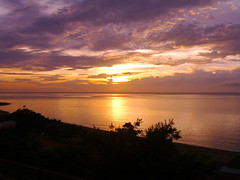My soon-to-be 95-year-old grandmother (Hi Grandma Ruth!) and my mom (Hi Mom!) each sent me an email this week and asked a few questions. Since I'm having a hard time coming up with ideas for blog entries, I figured I'd answer some of them here.
Is Trujillo is sort of isolated from the rest of the country being surrounded by mountains and tropical forests? Since Trujillo is on the coast do you get storms such as hurricanes, etc.?
Trujillo is nearly at the end of the coastal highway, CA-13. The highway technically ends at Puerto Castilla, but the road is really bad after Trujillo. Trujillo is more isolated than anywhere I've ever lived, but in the range of peace corps sites is not very isolated. It is a roundabout trip to get to the nearest city, La Ceiba, as the Highway heads east, then south around the mountains before finally heading northwest back towards La Ceiba. It takes about 3.5 hours one-way. Luckily, stores in Trujillo sell most everything that one needs, but prices are quite a bit higher than in Ceiba.
Trujillo does get storms, though the land here seems much better equipped to handle precipitation than other (more deforested) parts of Honduras. We had a wet front come through here and move on into the center of the country, where it wreaked havoc and caused severe flooding. There were barely even any puddles here. And the north coast does sometimes get hit by hurricanes. But only about once every 20 years. And the last one was in 1998.
Does it rain for long periods or just short time? Is it always quite a downpour?
May through July is a mini-rainy season (the real rainy season being November through February), and we get afternoon showers more often than not. It's usually a big downpour. Like afternoon thunderstorms in certain parts of the States. Unfortunately, the rain does little to lower the temperature. It just makes everything damp.
What you do for meals? Are you able to get fresh fruit and vegetables? Are there restaurants where you can get good food?
Food-wise, I eat breakfast and dinner with my host family, who has a muchacha that prepares their meals. I stick with Corn Flakes for breakfast, but she does make me dinner every night. There are plenty of places to by fresh fruits and vegetables (though there's not much variety). There are two supermarkets, each about the size of a 7-11. They carry a lot of foodstuffs, including peanut butter and cheese. Occasionally I skip dinner at home and cook a communal dinner with my sitemates (There are two other Peace Corps volunteers here and a Canadian volunteer). There are a lot of restaurants in Trujillo, though not much variety in what they serve.
My host family is very caring and feeds me well, but I am still looking forward to being able to cook my own meals and have my own place. This saturday, I signed on the dotted line for a one-bedroom apartment! I'm moving in on July 1st. The total cost is 2,000 Lempiras (a tad over $100) a month. Of course, it's unfurnished, and I don't have a lot of money to fill it with stuff. So it'll be like camping for a little while. There is a lumber yard nearby, so I'll probably buy some wood and make shelves and a desk for cheap.
On the lack of direction from Peace Corps...
I didn't mean to make it seem like Peace Corps is not giving us any support or direction. There's just a limit to what they can do for us. Each community has different characteristics and needs, and only the volunteer on the ground can make the contacts and form the relationships that are necessary to really know a community. I think Peace Corps does a very good job at giving us the resources we need to be effective volunteers, however the bulk of the work is still on the shoulders of the volunteer.
Subscribe to:
Post Comments (Atom)





4 comments:
So what are the dominent fruits and veggies there? I can guess that bananas are among them.
It sounds like the Peace Corps gives you freedom of judgment and trusts that you'll be productive, which is very appealing. Do you have to report to them at certain times?
Hi Raphael!
I've just found your blog online...
I am planning to go to Honduras as a volunteer in August. Will be going to Puerto Cortes to teach...
Was just wondering if you could give me any advice/ info what to expect/ be prepared for etc...... I know it sounds awful but Id really appreciate the help... I hope you dont mind, I will send you the same msg on facebook as the nick is on ur blog as well....
Thanks
Paulina
Hey Raph! I just wanted to say that i love checking what your life is like there. It's technically the rainy season here in the Chubu area, but it hasn't really been that bad yet. I'll be heading out of Japan in Aug. Hope things are great!
davey
Hey Amber -
The fruits and veggies we can get are the following:
kiwi (seasonal)
mango (seasonal)
apple (imported, expensive)
watermelon
plantain
banana
lime/lemon
squash
yucca
cabbage
tomato
onion
garlic
celery
cucumber
bell pepper
and some fresh herbs like lemongrass and cilantro
As for the Peace Corps, yes we have to report our work to them. We file pretty detailed work reports every six months. Also, during our first three months in site we have to file shorter reports.
Dave - Thanks for the comment, I follow your blog too, it sounds like you've been having a great time in Japan! Part of me is envious that you're returning to the states so soon.
Post a Comment